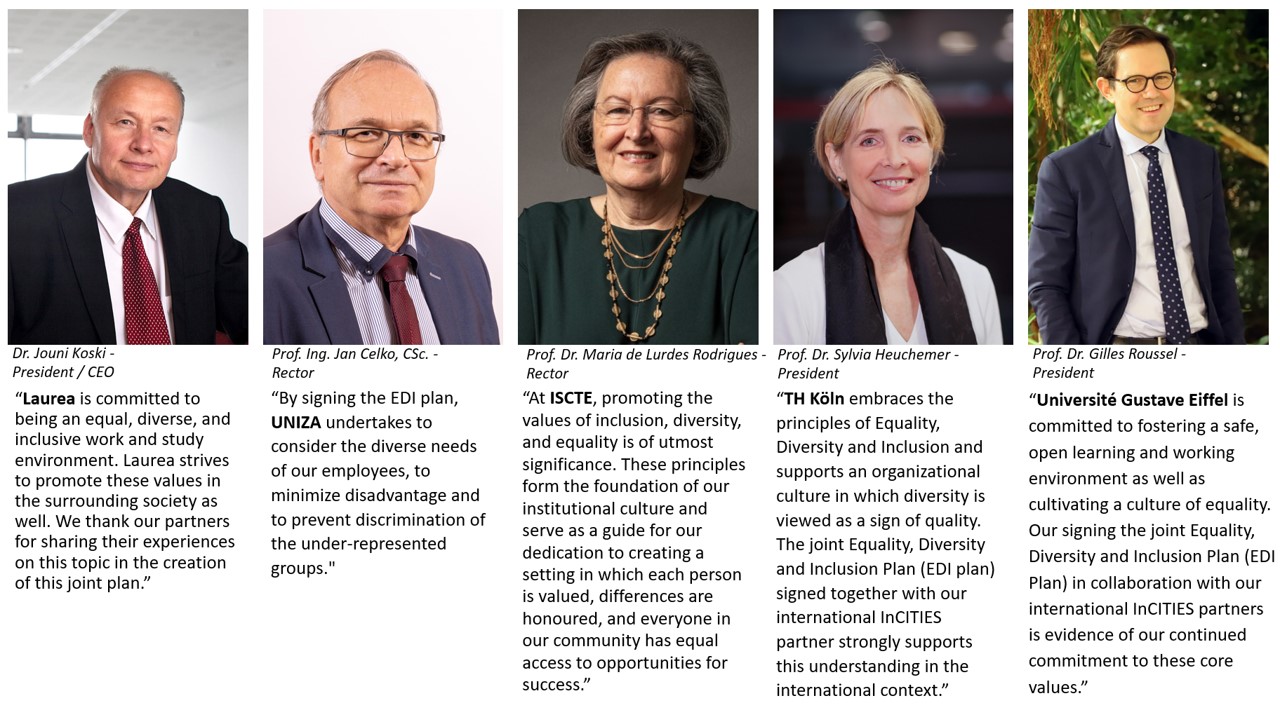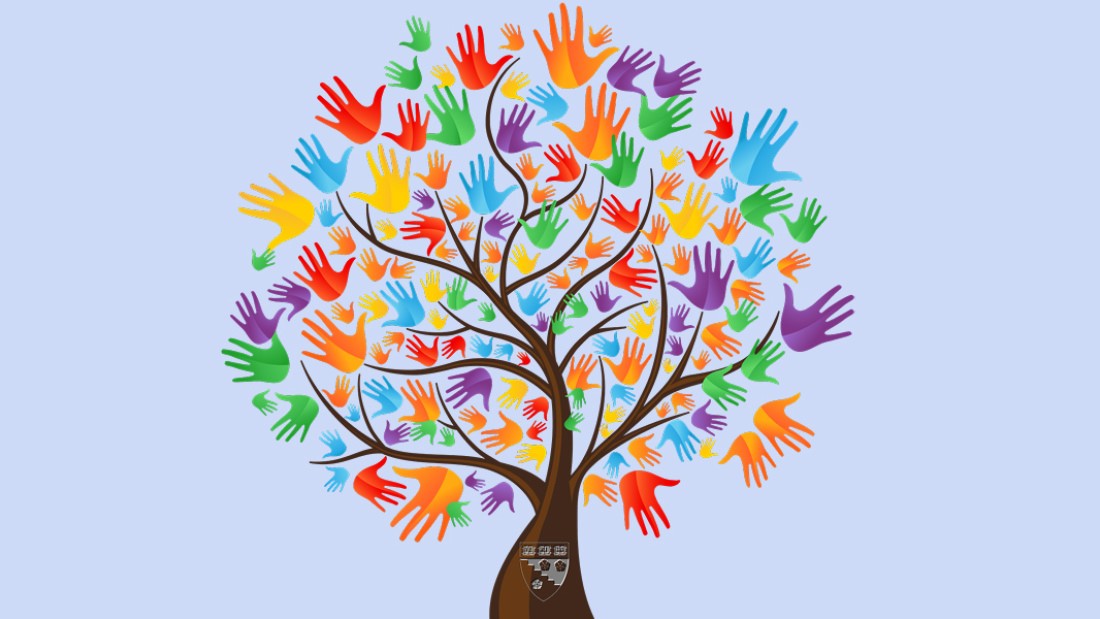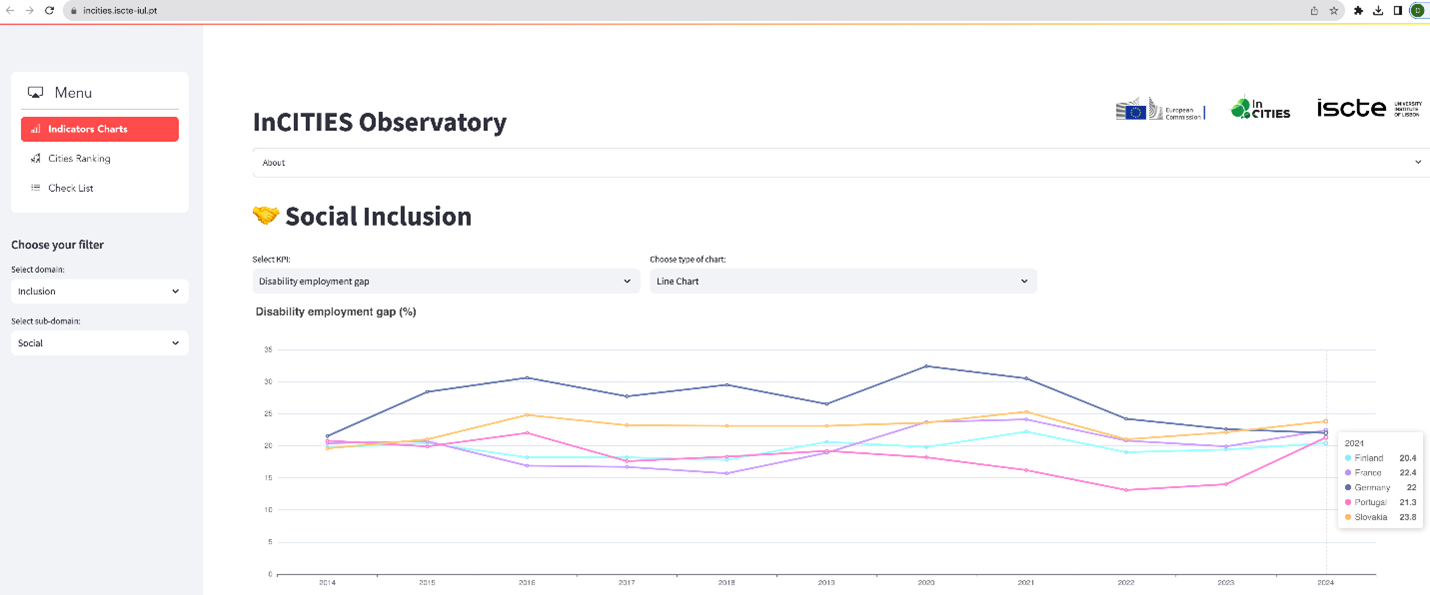Foreword
We, the InCITIES institutions Iscte-University Institute of Lisbon, Laurea University of Applied Sciences, University of Applied Sciences Köln, University of Žilina and Gustave Eiffel University, embrace the principles of Equality, Diversity and Inclusion in all areas of our institutions, for all members of our institutions.
Within our InCITIES project, we have analysed our measures and actions in regard to these principles and have learnt from each other. Being aware of institutional and cultural differences, we commonly agree to the following principles, and to continue sharing best practices within our InCITIES consortium and beyond (e.g. the Pioneer aiming at European Universities Alliances).
The constitution of the alliance was motivated by common ground and goals that point in a common direction: Our alliance aims at developing a new generation of learners, knowledge producers and innovators for society and future cities. As partners we share a strong research, development, and innovation (RDI) orientation in areas related to cities and urban challenges.
Leadership commitment
As leaders and managers, we have committed to the principles of Equality, Diversity and Inclusion (EDI) and continue to include them in strategy and policy papers and everyday practices. As leaders we understand that we are role models and spread the EDI issues to community, and towards positive organisational change.
Leadership is comprehensive and focused on creating an equal, inclusive and diverse culture throughout the organisation. We implement leadership development initiatives that emphasise inclusive leadership skills. We encourage all institutional members to take leadership and responsibility for EDI topics and create motivation for individuals.
In order to foster EDI, we aim at dedicating adequate resources to implement appropriate measures, training programmes and initiatives. We introduce all new employees to EDI topics.
Inclusive learning and work culture
For all members of the university, employees, and students alike, we strive to create a learning and work culture in which individuals can participate fully as a result of systemic barriers being removed. The outcome we target is an inclusive culture in which employees experience a sense of belonging where their uniqueness is embraced.
Inclusive environment and confidential points of contact
Our universities strive to be inclusive places for each member and visitor. We commit to appoint representatives for EDI and points of contact for all institutional members to reach out in cases of discrimination, gender-based-violence harassment, inappropriate behaviour, or other forms of misbehaviour. We create confidential points of contact where any person from our institutions can raise their case and feel safe from exposure to discrimination, harassment, or any other emotional or physical harm. Appointed representatives will be easily accessible for all members of the institutions, and contacting them will be confidentially offered. Appointed representatives will be properly trained.
Transparent and regular monitoring
We commit to collect information wherever possible covering misbehaviour as discrimination, harassment, violence, stalking or mobbing, for all members of the institutions.
We will monitor indicators for EDI in accordance with national laws / restrictions, and in accordance with the rules of our institutions. We agree to set appropriate objectives and measures for our EDI plans enabling monitoring through specific indicators. The monitoring will be performed on a regular basis. Its frequency will be stipulated in the institutional EDI documents. Monitoring results, pointing out the actual organisation “status quo” on EDI and the organisation needs in this area, will lead to improvements in EDI practices.
As part of transparent monitoring, we commit to publishing the monitoring results in the respective institutional documents (e.g. university annual report, web page) and to discuss them at top-level meetings of the organisations annually.
EDI integration into curriculum and research practices
We commit to appropriate EDI-related competences to foster inclusion of EDI elements into curriculum design, its regular update, curriculum delivery and also to research practices. Learning spaces and educational materials are to be accessible to all students.
We approach research challenges and initiatives also with EDI lenses. We thrive to apply inclusive research methods whenever required in various cultural and social contexts, as well as promote the results in a broader and accessible manner to wider audiences.
Recruitment, selection processes and career development
We strive for non-discriminatory selection processes and admission procedures for prospective students.
Corresponding with the European Charter for Researchers, we agree to establish and continuously improve recruitment and selection procedures which are open, transparent and merit-based for our academic and non-academic personnel. Our recruitment processes seek for excellence, gender equality, diversity, and being tailored to the type of position advertised.
Career breaks or variations in the chronological order of CVs and intersectoral mobility are not penalised, but regarded as the evolution of a career, and consequently, as a potentially valuable contribution to the professional development of university employees towards a multidimensional career track.
Our evaluation and appraisal procedures take account of applicants’ overall potential, their creativity (in the case of researchers, their research results and behaviour, activities, and mobility), and are taken into consideration within the context of career progression. We work towards establishing and maintaining transparent, structured, inclusive and gender-neutral career accession and progression systems at our institutions.
Academic and non-academic personnel at all career stages are given opportunities (e.g. training, participation in conferences, mentoring) to continuously improve themselves by updating and expanding their skills and competencies.
Community engagement
We aim at placing particular emphasis on building a culture that actively encourages and supports both students and staff to engage with the communities and their ecosystems through diverse initiatives, e.g. projects and service opportunities, ensuring that our educational institution becomes a proactive contributor to positive social change. This proactivity, by promoting reciprocal learning and understanding, will incentivise all members to become advocates for EDI.
We make an effort to build partnerships with a variety of stakeholders such as civil entities and business partners, who will collectively work on addressing common goals and problems, among other things, with regard to systemic inequalities.
We will actively involve the voices of those whom these issues concern, such as the affected target groups and experts by experience. By means of inclusive discussions and collaborative efforts, we aim to also include the viewpoints of marginalised populations into the decision-making procedures and promote joint accountability for constructive social transformation.
Communication and continuous improvement
We reach out to all members of the community by using diverse communication channels in addition to providing materials and documents which are accessible to everyone. We spread awareness on the usage of inclusive language.
We acknowledge, celebrate and communicate achievements related to equality, diversity and inclusion.
We understand that EDI issues are changing. This document is thus also a living document: we commit to refreshing and updating it as well as other documents and institutional guidelines regularly. We understand that there is a need for continuous improvement with respect to EDI in our appreciation and understanding of its components and related procedures.






